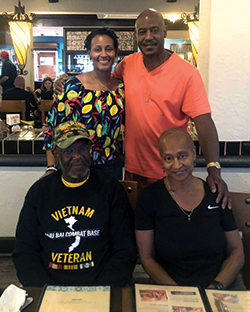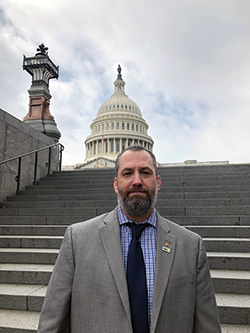
Growing up in Denver, Alfred “Al” Lewis Jr. had never considered joining the military even though he lived near an air force base. But after falling in with the wrong crowd and being expelled from high school, Lewis knew he needed a fresh start. Despite the country being at war in Vietnam in 1960, the 17-year-old enlisted in the Marine Corps.
He trained in chemical, biological, radiological and nuclear defense and deployed to Phu Bai Combat Base just south of Huế, Vietnam, in 1966. During his deployment, his primary duty was to stand guard at the air base and work in supply.
“I remember watching our planes spray a substance around the base to clear out the jungle,” Lewis explained. “We would end up walking through the substance while on duty at various points of the deployment and thought nothing of it at the time. It wasn’t until years later that we learned that it was Agent Orange and the impact it had on our health.”
During one of Lewis’ guard shifts, a mortar and rocket attack knocked him over and blew out his hearing, requiring him to be medevaced to Japan for evaluation and recovery.
The hearing loss affected him greatly, but otherwise he was healthy enough to continue serving. Lewis deployed for his second tour to Vietnam in 1970 and eventually retired as a master sergeant in 1981.
Upon retirement, Lewis filed a Department of Veterans Affairs disability claim independently and received compensation for hearing loss in one ear and injuries to his knee and back. He also returned to school, got bachelor’s and master’s degrees in accounting, and started a career as an auditor for the Naval Audit Service and Air Force Audit Agency.

In 2012, Lewis retired from his career as an auditor. Less than a year later, he had a heart attack and received treatment at the Loma Linda VA Medical Center. During his recovery, a friend from church who happened to be an Air Force veteran told Lewis he should contact DAV to review his disability claim.
Lewis reached out to a DAV benefits advocate in Los Angeles who worked with him to establish that his heart condition was service-connected due to Agent Orange exposure. The VA awarded Lewis a disability for his heart but denied his claim for hypertension since it was not a presumptive condition at the time of filing.
“I was so thankful to DAV for representing me and advising me on the benefits I qualified for,” said Lewis. “I thought I could file my disability claim by myself, but I was unaware of all the conditions related to Agent Orange exposure. I wish I had DAV representation when I first filed my claim.”
After getting his disability compensation upgraded, Lewis decided to become a lifetime member of DAV and stayed in touch with the local benefits advocate to see if they could get his hypertension service-connected. In fall 2022, Adam Barnes, the national service office supervisor in Los Angeles, talked to Lewis about the new presumptive conditions related to toxic exposures that qualified for benefits under the Honoring our PACT Act.

Barnes informed Lewis that, thanks largely to DAV’s legislative advocacy, hypertension was now a presumptive condition. Barnes helped him file a new claim, and in early 2023, Lewis got word that he would finally get the benefits he earned for that condition.
“Lewis had fought for many years to get all the benefits he deserved,” said Barnes. “It was great to inform him of the changes to the law and get him the rating that accurately reflects all the conditions that have impacted his life and overall health.”
“Lewis’ story is a great example of how professional representation makes a difference in veterans’ lives,” said DAV National Service Director Jim Marszalek. “Our benefits advocates are experts in providing the latest information on veterans benefits, including the most recent updates from the PACT Act, and they know how to get positive results.”






